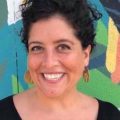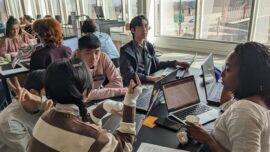University of Cincinnati
The Arts at the University of Cincinnati
The University of Cincinnati’s cutting edge transdisciplinary research, practice and teaching is evidenced in programs such as Digital Futures, the Community Change Collaborative (C3); the Institute for the Advanced Study of Democracy & Culture, the UC Strange Tools Lab, the UC Biodesign Challenge Lab , the Institute for Research in Sensing (IRiS), and Sustainability@UC. These programs build upon the foundation of the academic offerings at the UC College of Design, Architecture, Art, and Planning (DAAP) , the UC College Conservatory of Music (CCM), the UC College of Arts & Sciences (A&S), the UC College of Engineering & Applied Science (CEAS), and the UC College of Education, Criminal Justice and Human Services (CECH).

a2ru Campus Contacts


Jennifer joined the University of Cincinnati Office of the Vice President for Research in 2016. Her portfolio includes: Strategic initiatives including executive direction of the Intuitional-level Urban Impact/Urban Futures Initiative; Research initiatives in the Arts, Humanities, and Social Sciences; The Alliance for the Arts in Research Universities (A2RU) initiative; and UC Research and Innovation Week. Jennifer serves on University committees and advisory boards including the UC Executive Research Advisory Board. She develops and administers university-wide, internal funding programs and develops and fosters research collaborations, cross-institutional partnerships, and alliances between UC research and external partners that positively affect the intellectual, cultural, and overall well-being of the community, region, and our global society.
Dr. Kristopher Holland is the Director of Visual Arts & Design Education State Licensure for the College of Design, Architecture, Art, and Planning, and is the Director of the Strange Tools Research Lab in the Digital Futures initiative at the University of Cincinnati. He is also a Guest Professor at the Karl Franzens University in Graz Austria teaching courses on contemporary art, art history, and arts-based research. He also co-directs the biannual Berlin Summer Studio Arts Inquiry program in collaboration with the Weißensee Kunsthochschule Berlin. Dr. Holland is a practicing artist and philosopher whose current research interests are: philosophical inquiry methodologies, arts-based research, art & design teacher education, affect theory, deconstruction, contemporary art and critical theory. He has recently given guest lectures at the New York University Steinhardt School of Culture, Education, and Human Development on the topic of Jean Baudrillard and ‘Post-Art,’ and at the University of Graz on ‘American Theory.’ He is presently researching the role of aesthetic inquiry and Object Orientated Ontology (Triple-O) plays contemporary art practice and theory. His conceptual art work The Habermas Machine was cited in James Rolling Jr.’s book Arts-Based Research: A Primer, published in 2013 and was exhibited in 2015. He has co-authored the forthcoming book On Being a Fatal Theorist: Jean Baudrillard’s Strategy for the Anthropocene.


Nandita Baxi Sheth works at the intersections of Art, Education, and Community as the Assistant Director Academic in the College of Design, Architecture, Art, and Planning at the University of Cincinnati. She works as DAAP’s Liaison to the UC/Hughes Initiative to design, coordinate, and implement college access and summer bridge programming with UC’s neighboring community high school. Additionally she serves as DAAP’s Liaison for Diversity and Inclusion and leads the college wide Diversity and Inclusion Team. In 2015 she obtained a Masters in Visual Arts Education and Ohio State Licensure in Visual Arts Education. She teaches High School students in After School Programming with Hughes STEM HS and instructs in the Art Education progam. She has a background in Architecture and Planning with an B.A. from Rice University, majoring in Architectural Studies, English, and Art and a Master’s of Community Planning from the School of Planning at DAAP. Her research interests include: the application of arts based research methodologies to consider “wicked problems”; the curricular impacts of art and technology on education; exploration and development of cross disciplinary STEAM initiatives, and using the lenses of affect theory and aesthetics to craft alternate forms of assessment.


Dr. Gaskins is the Assistant Dean of Inclusive Excellence and Community Engagement in the University of Cincinnati College of Engineering and Applied Science, the only African-American female currently teaching in the faculty of the College of Engineering. Whitney earned her Bachelor of Science in Biomedical Engineering, her Masters of Business Administration in Quantitative Analysis and her Doctorate of Philosophy in Biomedical Engineering/Engineering Education. In her role as Assistant Dean, Dr. Gaskins has revamped the summer bridge program to increase student support and retention as well as developed and strengthened partnerships in with local area school districts to aid in the high school to college pathway. She serves as the Principal Investigator for both the Choose Ohio First Program (COF) and Ohio LSAMP grants. Through these grant programs the students receive competitive scholarship funding and professional development workshops which help prepare them to enter into the STEMM workforce.She was a recipient of the Dr. Terry Kershaw Faculty Excellence Award and the Excellence in Teaching Award from the University of Cincinnati for her innovative honors course Sticky Innovation (stickyinnovation.com).

Tony’s research is both philosophical and empirical. It is focused on questions related to dynamical modeling, ecological psychology, artificial life and complex systems. He is author of more than 70 articles and the book Radical Embodied Cognitive Science (2009, MIT Press), which was a finalist for the Lakatos Award. His second book, co-authored with Stephan Kaufer, will appear on Polity Press. He is currently editing the second edition of the MIT Encyclopedia of the Cognitive Sciences.


Stephanie Sadre-Orafai is a sociocultural anthropologist whose research focuses on the production of difference and types among expert communities in the United States. Her ethnographic work examines media and cultural producers, emerging forms of expertise, the intersection of race, language, and visual practices in aesthetic industries, and forms of evidence and the body. She studied anthropology with a minor in African American Studies at the University of California, Berkeley (BA, 2000) and received her Ph.D. from the Department of Anthropology at New York University in 2010, when she also joined the faculty at UC. Her essays on casting, model development, and fashion reality television have appeared in several edited volumes. She is currently working on her first book, tentatively titled Real People, Real Models: Casting Race and Fashion in 21st Century America, which examines the history of casting in the New York fashion industry, the rise of non-professional or “real people” models, and how modeling and casting agents produce models’ bodies as forms of media, creating new articulations of mediation, visibility, and difference in the process. She is also working on a comparative project, Type by Design, that explores the overlapping concerns of inanimate (typefaces) and animate (models) type production in the commercial font and high fashion modeling industries in New York City. She co-directs the Critical Visions Certificate, a joint effort between faculty in the College of Design, Architecture, Art, and Planning and College of Arts and Sciences, which she established with Jordan Tate in 2011. The program is aimed at teaching students how to effectively combine critical theory and social analysis with art, media, and design practice.


